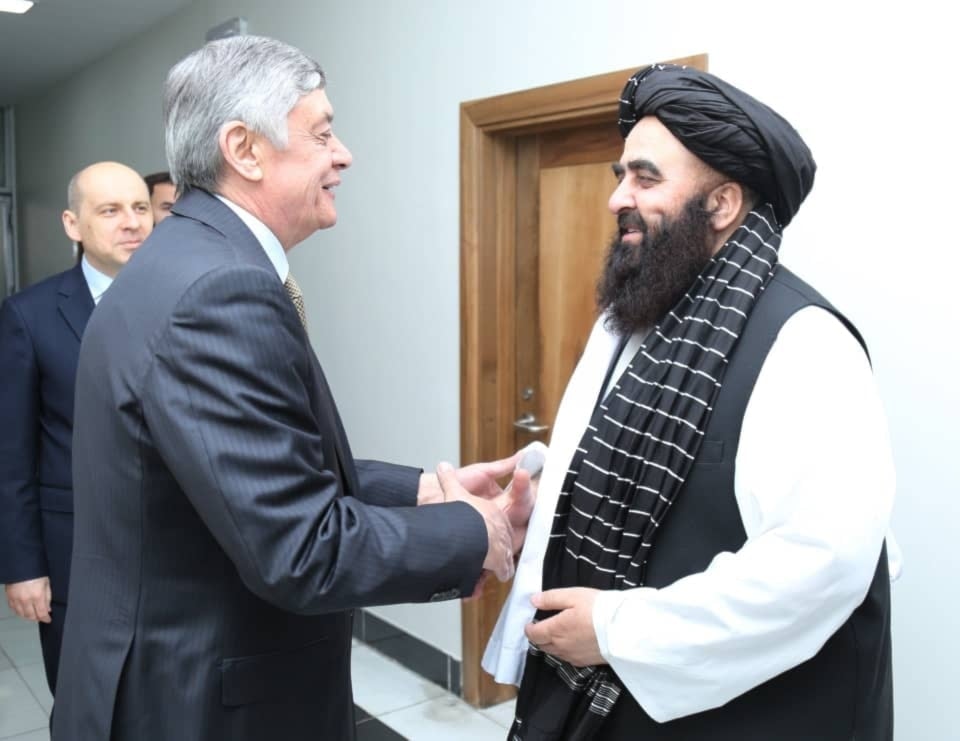Russia to host Afghan envoy in Moscow after ban lifted
The Taliban have celebrated the lifting of the terrorist label as a breakthrough in their pursuit of international legitimacy.
-

Foreign Minister Mawlawi Amir Khan Muttaqi announced that Russia has agreed to receive a diplomat at the ambassador level. He added that an ambassadorial envoy will be sent to Moscow in the near future (@ahmadullah77527)
Russia announced Wednesday that it will permit the Taliban to appoint an ambassador in Moscow, a symbolic yet consequential step that comes shortly after Russia's Supreme Court lifted the group's terrorist designation, a status held since 2003. Initiated by the Prosecutor General's Office and made possible by legal reforms, the move marks a deepening of Moscow's evolving relationship with the Taliban-led administration in Kabul.
Since the Taliban returned to power following the US withdrawal in 2021, Russia has cautiously but consistently expanded its engagement. In recent talks with Taliban foreign and internal affairs ministers, Russian officials formally communicated the decision to upgrade the group's diplomatic presence in Moscow.
"The representatives of the Afghan leadership were informed that, following the decision announced by the Supreme Court of Russia to suspend the ban on the Taliban movement, the Russian side has decided to upgrade the diplomatic mission of Afghanistan in Moscow to the level of ambassador," the foreign ministry stated. It added that the Afghan side "expressed their deep gratitude for this step."
Although this move falls short of formal diplomatic recognition, it signals a notable strategic shift. Taliban officials have attended multiple high-level events in Russia, and mutual interest in economic and security collaboration has grown. Moscow views cooperation with the Taliban as a potential means to address regional instability and combat threats from groups like Islamic State Khorasan (ISIS-K), which was behind a March 2024 terrorist attack near Moscow that killed 145 people.
The Taliban, for their part, have celebrated the lifting of the terrorist label as a breakthrough in their pursuit of international legitimacy. "The new authorities in Kabul are a reality," said Russian Foreign Minister Sergei Lavrov. "We need to take this into account in order to carry out pragmatic, not ideologised policy."
د کورنیو چارو وزیر د افغانستان لپاره د روسیې د ولسمشر له ځانګړي استازي، ضمیر کابلوف او په کابل کې د روسيې سفير دميتري ژيرنوف سره کتلي دي.
— Ahmad Saeed (@ahmadsaeed4969) April 23, 2025
او دواړو لوریو د افغانستان او سیمې پر امنیتي، اقتصادي او سوداګریزو همکاریو، او د دواړو هېوادونو ترمنځ د اړیکو پر پیاوړتیا خبرې کړې دي. pic.twitter.com/hhCgNP9ZxP
These diplomatic developments coincide with internal initiatives in Afghanistan aimed at asserting the Taliban's administrative control. On April 5, the Taliban government announced the completion of 370 infrastructure-focused development projects over the past year, funded entirely by domestic revenues. While the projects reportedly generated thousands of jobs, many Afghan citizens remain skeptical amid widespread poverty and unemployment. According to the UN, over half the country's population still requires urgent humanitarian aid.
Read more: Afghanistan completes 370 State-funded projects in one year
Despite continued international non-recognition and heavy Western sanctions, the Taliban have expanded ties with regional powers like China and Iran. Russia, through trade, fuel supply, and now diplomatic normalization, has emerged as one of the most openly engaged actors, a position that could signal a broader shift in Eurasian geopolitics.

 3 Min Read
3 Min Read










